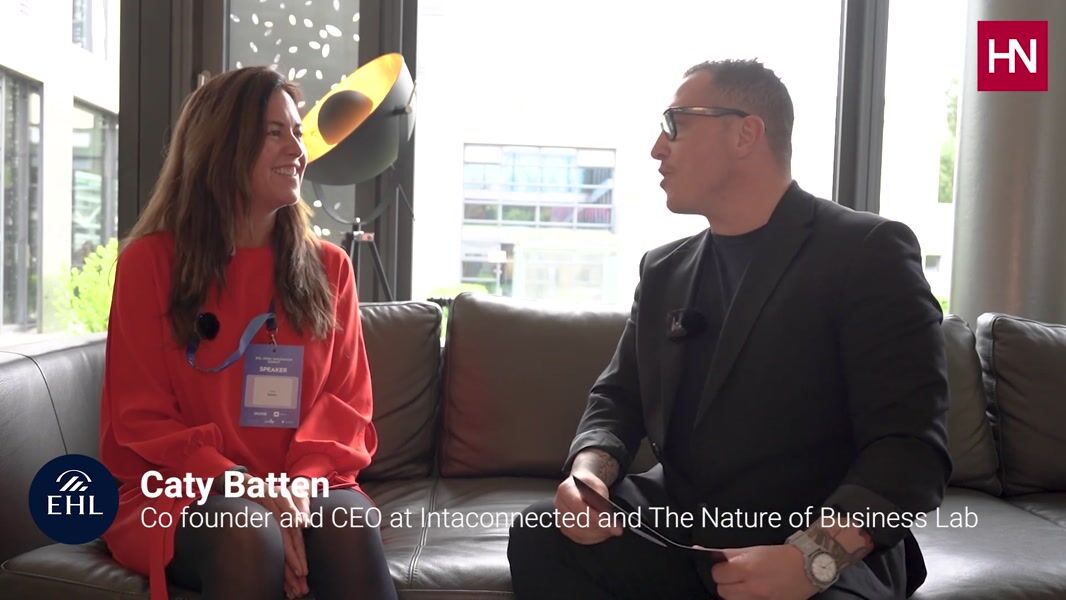
During the EHL Open Innovation Summit in Lausanne, we spoke with Caty Batten, Co-founder and CEO at Intaconnected and The Nature of Business Lab, about how the hospitality industry can move beyond traditional sustainability and embrace a regenerative approach. Our conversation focused on the Net Positive Hospitality Pathway, a practical tool for building resilience and long-term value, and why regeneration must become the new standard for climate, nature, and people.
Which technology or innovation will most reshape the travel and hospitality industry over the next 5 to 10 years?
Caty Batten highlighted that companies across all sectors, including hospitality, are facing a myriad of complex challenges — climate change, loss of nature, geopolitical tensions — all of which impact supply chains, talent mobility, and business resilience. She explained that while many technologies can support adaptability, one innovation she is excited about is the Net Positive Hospitality Pathway, developed in collaboration with the Sustainable Hospitality Alliance and Intaconnected. This end-to-end, modular pathway helps hospitality companies understand the full spectrum of their impacts on climate, nature, and people. It provides a constantly evolving manual that will become digitized, offering step-by-step guidance to support all stakeholders — from boardroom to front-line teams — in building resilience, mitigating risk, and supporting the communities they rely on.
What is regeneration for you?
To answer this, Caty first clarified what sustainability means. Sustainability is meeting the needs of the present without compromising the future. But we have already depleted resources so dramatically that sustainability is no longer enough. The planet’s resources are being used one and three quarter times faster than they can regenerate. We are in overshoot earlier and earlier every year. That is unsustainable. Regeneration is about restoring what has been lost. It means reimagining and transforming our economic system — from one built on extraction and short-term shareholder value to one based on the scientific principles of living systems. This includes stakeholder participation, health, vitality, and balance. She explained that our economy, food, hospitality, energy, and material systems all operate separately. We need to start seeing them as interconnected. Regeneration asks how we can create the conditions for life to thrive — for people, ecosystems, and communities. As a stepping stone, the concept of net positive moves us beyond harm and into creating more value than we take.
Can you give a real-life example of the business case for regeneration?
Caty acknowledged that sustainability has often been treated as a compliance issue — a way to do less harm — and kept on the sidelines. But a regenerative or net positive approach is different. It hits the bottom line by addressing evolving market forces: regulations, customer expectations, talent attraction, supply chain disruptions, and the loss of natural resources. She cited Red Sea Global in Saudi Arabia as an inspiring example. The company is building new hotels and resorts along the Red Sea coast while fully embracing a net positive pathway. Their approach supports local communities and builds the foundations needed to create places guests want to visit — with a focus on long-term value and resilience.
About the EHL Open Innovation Summit 2025
This interview was recorded during the EHL Open Innovation Summit in Lausanne, where Hospitality Net joined as official media partner.
The event brought together a global mix of thinkers and doers to explore the future of hospitality, food, and travel through open innovation. What made it special was the mix of ideas, formats, and people. It was not only about tech or talks. It was also about people showing up, working together, and sharing energy in real time.
Key Figures
- 385 participants
- 48 speakers and contributors from more than 20 countries
- 7 innovation challenges collectively addressed
- 45 sessions
- 25 student volunteers
- 15 F&B startups letting us taste the future
- 1.5 days of connection, learning, and co-creation
Key Insights from the Summit
- A new benchmark for hospitality innovation
The summit set a new standard by weaving together AI, sustainability, regeneration, and human connection – showing that innovation in hospitality, luxury and food must be holistic, human-centric, and purpose-driven. Participants repeatedly highlighted the need to go beyond efficiency and into meaningful transformation. - From knowledge exchange to real-time co-creation
More than just a series of talks, the summit was an activation space – a living lab where diverse minds worked together on pressing challenges, from regenerative tourism to circular luxury to AI in guest experience. It was a showcase of collective intelligence in motion. - Collaboration as the engine of systems change
Open Innovation came alive not as a buzzword, but as a relational practice. From panelists to students, from global explorers to startup founders, everyone was invited to co-create, connect dots, and contribute. Participants repeatedly said they experienced true collaboration across boundaries, industry, sector, age, and background. - The power of presence: hearts, minds, and hands
Whether walking in the forest, painting together, or debating future systems, attendees embraced the idea that innovation isn’t only about tech and metrics – it’s also about embodied experience, slowing down to speed up, and nurturing a regenerative mindset. - The future is “AND” – not “either/or”
A recurring takeaway: we must stop choosing between extremes. The future is tech AND human, healthy AND delicious, profitable AND impactful. This “integration mindset” is already informing how leaders, startups, and educators present are reshaping their strategies. - The beginning of a long-term movement
Attendees described the summit as the start of something much bigger – a platform for experimentation, learning, and alliance-building. The EHL Innovation Hub was recognized not only as an academic powerhouse, but as a true catalyst for regenerative innovation across hospitality, service, food, and travel.
Please visit:
Our Sponsor
